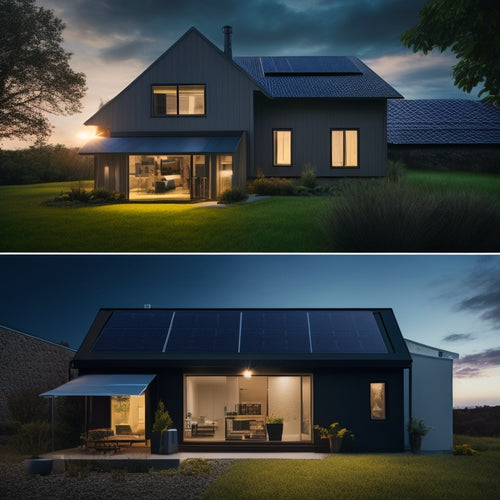Future of Home Battery Storage Technology
Share
The future of home battery storage technology is promising, offering you increased energy independence and resilience. As energy costs rise, efficient systems using advanced battery chemistry will emerge, reducing reliance on the grid and enhancing savings. Innovations like smart algorithms and modular designs will optimize efficiency and capacity based on your energy needs. Furthermore, systems equipped with predictive analytics will extend battery lifespan and lower maintenance costs. By integrating renewable energy sources, you'll guarantee continuous power supply, even during outages. Stay tuned for information into how these advancements can revolutionize your energy management strategies.
At a Glance
- Advancements in battery chemistry, including solid-state and lithium-silicon technologies, promise increased efficiency and longer lifespans for home battery systems.
- Smart battery management systems utilizing predictive analytics will optimize performance and energy usage in real-time, enhancing overall efficiency.
- Modular battery designs will allow homeowners to scale their storage capacity flexibly based on evolving energy needs and consumption patterns.
- Integration of renewable energy sources with home battery systems will ensure sustainable and resilient backup power, enhancing energy independence.
- Ongoing innovations in thermal management and intelligent charge controllers will reduce wear and maintenance costs, improving the long-term reliability of battery systems.
Energy Independence and Savings
Achieving energy independence through home battery storage can drastically reduce your reliance on the grid, offering a cost-effective solution to rising energy prices.
By utilizing renewable energy sources, such as solar power, you can enjoy significant savings while also reaping the benefits of off-grid living.
This technology not only enables you to take control of your energy consumption but also positions you for a more sustainable future.
In addition, staying updated on technological advances can enhance the efficiency of your energy storage solutions.
Cost-Effective Energy Solutions
As energy costs continue to rise, exploring cost-effective energy solutions becomes vital for those seeking independence and savings. By integrating solar energy into your home, you tap into renewable sources that not only lower your electricity bills but also provide long-term financial stability.
Smart technology enhances this integration, allowing you to monitor and optimize energy storage effectively. Conducting a thorough cost analysis helps you identify the best installation options customized to your needs.
You'll find that contemporary battery storage systems are designed to support grid stability, offering backup power during outages while minimizing reliance on traditional energy sources. Additionally, market trends show an increasing focus on battery recycling, which not only addresses environmental concerns but also reduces long-term costs.
Policy incentives play an essential role in making these solutions more accessible, further supporting your progression toward energy independence. As you adopt these advanced technologies, you're not just reducing expenses; you're contributing to a sustainable future.
With the appropriate energy storage solutions, you enable yourself to take control of your energy needs, positioning yourself at the forefront of the changing energy environment.
Off-Grid Living Benefits
Exploring off-grid living not only enhances energy independence but also leads to significant savings. By utilizing renewable resources like solar, wind, and hydro, you can create a self-sufficient energy system that reduces reliance on traditional power grids. This shift allows you to escape fluctuating energy prices while contributing to sustainable living.
When you invest in home battery storage technology, you store excess energy generated during peak production times. This stored energy becomes your buffer against outages, ensuring your lifestyle remains uninterrupted. By eliminating monthly utility bills, you can redirect those funds toward further improving your off-grid lifestyle.
Moreover, off-grid living encourages innovative energy management practices. You'll learn to optimize your consumption and become more conscious of energy use, cultivating a mindset geared toward efficiency.
The combination of renewable resources and state-of-the-art battery storage solutions positions you at the forefront of a sustainable future.
As you adopt this lifestyle, you not only gain financial freedom but also a deep sense of autonomy. In a world increasingly reliant on centralized power, your commitment to off-grid living enables you to take control of your energy destiny.
Increased Energy Resilience
With home battery storage, you gain enhanced grid independence, allowing you to rely less on external energy sources. This technology not only stabilizes your energy supply but also provides an emergency power source during outages.
By integrating renewable energy systems like solar and wind, homeowners can maximize the benefits of battery storage, reducing reliance on the grid and promoting energy independence.
As energy demands grow and grid reliability decreases, investing in battery storage becomes a critical strategy for maintaining your energy resilience.
Enhanced Grid Independence
Enhanced grid independence through home battery storage technology considerably strengthens energy resilience, enabling households to manage their energy needs more effectively.
By integrating smart grid solutions, you can optimize energy usage, reducing reliance on traditional power sources. This integration allows you to utilize renewable energy collaboration, maximizing the benefits of solar or wind power generated at home.
With a home battery system, you can store excess energy produced during peak generation periods and use it during times of high demand or outages. This capability not only enhances your energy autonomy but also mitigates the effects of fluctuating energy prices and grid failures.
The ability to draw from your stored energy during peak times enables you to take control of your energy consumption, ensuring that you're not at the mercy of external factors.
Furthermore, as smart grid technologies evolve, your home battery will seamlessly communicate with the grid, optimizing energy flow and enhancing overall grid stability.
This shifting interaction cultivates a more resilient energy environment, creating opportunities for a future where freedom from conventional energy sources isn't just a dream, but a reality you can achieve.
Emergency Power Supply
Providing an emergency power supply through home battery systems greatly improves energy resilience, ensuring you remain powered during outages or grid failures. With the increasing frequency of power outages, investing in backup systems becomes vital for your emergency preparedness.
These systems not only enhance your energy security but also contribute to disaster readiness by allowing you to maintain home safety.
By prioritizing battery storage, you can manage essential loads like refrigeration, medical devices, and communication tools, minimizing disruptions in your daily life. The integration of renewable energy sources with home battery systems allows for seamless energy management, ensuring a sustainable approach to backup power.
Quick deployment of these systems during an outage means you won't be left in the dark for long.
User training is essential for maximizing the effectiveness of your battery system. Understanding how to prioritize loads and efficiently apply stored energy can greatly impact your emergency response.
As technology evolves, home battery storage will become an integral part of your energy strategy, providing peace of mind and the freedom to remain self-sufficient during unforeseen events.
Accept this forward-thinking solution to safeguard your home and future.
Battery Lifespan and Efficiency
To maximize your home battery's lifespan and efficiency, you'll want to investigate various improvement strategies and optimization techniques.
Regular maintenance practices, such as quarterly inspections and checking electrolyte levels, play an essential role in prolonging battery life and performance, as highlighted in maintenance practices for solar batteries.
By understanding the factors that influence battery longevity, you can make informed decisions that enhance performance and reduce degradation.
Implementing these strategies not only increases efficiency but also guarantees your investment continues to deliver value over time.
Lifespan Improvement Strategies
As home battery storage systems continue to gain popularity, it's vital to investigate effective strategies for improving their lifespan and efficiency. One of the most promising avenues is through battery chemistry advancements. By adopting newer chemistries, like solid-state batteries or lithium-silicon technologies, you can greatly enhance energy density and decrease degradation rates, allowing your system to last longer.
Moreover, lifespan prediction models play an important role in optimizing your battery's longevity. These models employ data analytics and machine learning to forecast potential failures based on usage patterns, temperature fluctuations, and charging cycles. By understanding how your battery operates over time, you can make informed decisions about maintenance and usage that prolong its life.
Additionally, implementing smart battery management systems can help you monitor performance and adjust operating parameters in real time. This proactive approach can mitigate stress on the battery and improve overall efficiency.
Efficiency Optimization Techniques
Optimize your home battery storage system's efficiency by implementing advanced techniques that enhance both performance and lifespan.
Start by utilizing smart algorithms that utilize predictive analytics to anticipate energy demands and optimize battery usage. This not only maximizes efficiency but also prolongs battery life through effective load balancing.
Integrate strong software solutions for performance monitoring, ensuring you can track battery chemistry and health in real-time.
By adopting thermal management practices, you can mitigate overheating, a common issue that reduces battery efficiency.
Consider employing modular systems that allow flexibility in scaling your storage capacity, adapting to your unique energy needs.
Incorporate peak shaving strategies to minimize energy costs during high demand periods, allowing your system to utilize renewable integration effectively.
This approach not only optimizes performance but also aligns with sustainable energy practices.
Selecting Based on Capacity Requirements
To select the right home battery storage system, you need to first understand your energy needs.
By evaluating your usage patterns, you'll gain understanding into the capacity requirements that align with your lifestyle and consumption habits. This analytical approach guarantees you invest in a system that best supports your energy demands.
Additionally, considering features such as high round-trip efficiency can help maximize the effectiveness of your chosen system, guaranteeing minimal energy losses and greater savings over time.
Understanding Energy Needs
When selecting a home battery storage system, it's crucial to assess your energy needs based on capacity requirements. Understanding your energy consumption is the first step in this process.
Begin by conducting energy audits to identify usage trends within your household interactions. This data will help you determine how much power management is necessary to maintain a balance between your energy demands and the battery's capacity.
Consider the impact of renewable integration on your overall energy strategy. As technology advancements continue to improve efficiency, you'll want a system that can adjust to your lifestyle changes.
Think about how your grid interactions may evolve; a smart battery can optimize energy storage based on demand forecasting and real-time consumption.
You should also evaluate your future energy needs. Will you be adding electric vehicles or new appliances? Anticipating these shifts can greatly influence your capacity requirements and guarantee your battery system remains relevant over time.
Assessing Usage Patterns
After identifying your energy consumption patterns, the next step is to evaluate how these patterns influence your battery capacity requirements. Conducting a thorough consumption analysis will enable you to pinpoint your peak usage trends. This understanding is essential for selecting a home battery system that aligns with your lifestyle and energy independence goals.
Start by examining your daily and seasonal usage patterns. Are there specific times when your energy demand spikes, such as during evenings or weekends? Comprehending these fluctuations helps you determine the necessary capacity to cover your needs without interruption.
Next, consider the duration of storage required. If you aim to rely on stored energy for extended periods, you'll need a battery system with a higher capacity. This guarantees you can utilize energy from your solar panels or the grid efficiently, even during low production times.
Additionally, think about future energy needs. As you adopt more energy-intensive devices or shift to electric vehicles, your capacity requirements may change. By proactively evaluating your usage patterns and adjusting your battery capacity accordingly, you can achieve greater energy autonomy and flexibility in your home.
Lower Long-Term Maintenance Costs
When you consider home battery storage, reduced component wear greatly impacts long-term maintenance costs.
By choosing systems designed for efficiency, you minimize stress on essential components, leading to fewer replacements and repairs.
This proactive approach not only enhances reliability but also translates to substantial savings over the lifespan of your battery system.
Reduced Component Wear
Modern home battery storage systems are designed to minimize component wear, which considerably reduces long-term maintenance costs. By focusing on component durability, these systems employ advanced materials and engineering techniques that enhance performance and longevity. This proactive approach guarantees that the internal components experience less strain during charge and discharge cycles, promoting wear reduction.
You'll find that innovations such as thermal management systems and intelligent charge controllers play an essential role in mitigating wear. These technologies not only maximize energy flow but also maintain ideal operating conditions, which is crucial for preserving the integrity of battery cells. As a result, you can expect a significant decrease in the frequency of repairs and replacements, leading to greater cost efficiency over time.
Furthermore, the shift towards modular battery designs allows for easier upgrades and replacements of specific components, further enhancing your system's resilience. By investing in these modern solutions, you equip yourself with a more reliable energy source that aligns with your desire for autonomy.
Ultimately, reduced component wear translates to peace of mind, knowing that your home battery storage system will serve you well for years to come.
Frequently Asked Questions
What Are the Environmental Impacts of Home Battery Production?
Home battery production often relies on sustainable materials, but if not managed properly, it can generate harmful waste. Implementing effective recycling processes is essential for minimizing environmental impacts and promoting a cleaner, more responsible energy future.
How Do Home Batteries Integrate With Solar Power Systems?
Home batteries enhance solar power systems by storing excess energy, maximizing battery efficiency. This solar collaboration allows you to leverage renewable energy, providing freedom from traditional grids and ensuring reliable, sustainable power for your home.
What Safety Measures Are in Place for Battery Storage Systems?
While enjoying the freedom of energy independence, you'll find safety measures like thermal management and fire prevention essential. Battery monitoring and system redundancy guarantee reliability, allowing you to utilize power without compromising safety.
Are There Government Incentives for Installing Home Battery Systems?
Yes, you can benefit from federal rebates, state programs, tax credits, and installation grants for home battery systems. These incentives promote energy efficiency and encourage home upgrades, helping you maximize savings while enhancing your energy independence.
How Does Battery Technology Impact Electric Vehicle Charging at Home?
Battery technology greatly improves your home's electric vehicle charging efficiency by integrating with the smart grid. This collaboration optimizes energy usage, allowing you to charge your vehicle more effectively while maintaining energy independence and freedom.
Explore More
As you investigate the future of home battery storage, remember it's not just about energy independence; it's about crafting a resilient energy ecosystem. With advancements in lifespan and efficiency, these batteries are becoming the backbone of modern homes. By selecting the right capacity, you're not just investing in technology; you're investing in peace of mind. As costs decrease and performance improves, this shift will change your home into a power fortress, ready for whatever the future holds.
Related Posts
-

What Happens Without a Charge Controller in Solar Panels
Without a charge controller in your solar panel system, you risk overheating batteries due to overcharging, which can...
-

Smart Grid Technology Implementation Challenges
You'll encounter several challenges when implementing smart grid technology, particularly in cost management, scalabi...
-

Cost of Home Solar Battery
You're looking to invest in a home solar battery to reduce your grid reliance, but you're curious about the cost. The...


